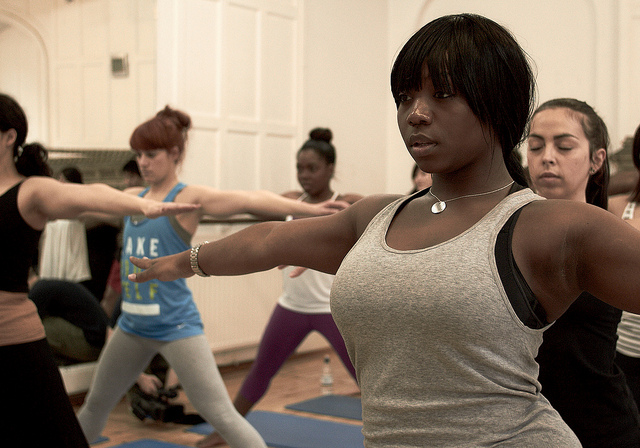
“Your beliefs become your thoughts,
Your thoughts become your words,
Your words become your actions,
Your actions become your habits,
Your habits become your values,
Your values become your destiny.”
~ Mahatma Gandhi
~
There have been so many times that I told myself I was going to start painting again, or that I was going to stop cracking my knuckles.
There were at least five times that I tried to quit coffee before finally succeeding a year ago. Maybe you’ve tried to quit cigarettes or to take up running. Habits are hard to form and hard to break.
However, as this quote from Gandhi demonstrates, we know that our actions become our habits and our habits our life.
This article will address habits in general, but specifically in mind of spiritual practice—yoga and meditation.
I cannot emphasize enough the importance of daily practice. It doesn’t matter what it is we are doing, whether it’s a creative pursuit, a lifestyle choice, diet, or whatever, if we want to get good at it, then we must do it every single day!
In the yoga tradition there is an understanding of how to ingrain a new habit in ourselves on different levels, from semi-permanent to permanent. If one does something every single day for 21 days, then that activity enters pranamayakosha—the etheric/pranic body.
One’s energy starts to become habituated to it. However, it is still a fragile habit and if not attended to, it will easily break. I know this has happened to me—starting out with all the inspiration, going a few weeks with it, and then starting to slack off. Before I knew it, I would be back to zero.
If one does something every single day for 49 days, then it enters manomayakosha—the emotional body. It has penetrated through and become embedded in the lower mind. Habits cultivated to this point still often require some external motivation to maintain.
If one does something every day for six months then it enters the vijnanamayakosha—the wisdom body. This level is already very deep, but still not the deepest, and so it will still need some effort from within, some inspiration to thrive.
To make a habit truly ingrained in one’s being, it is said that it requires a daily practice for 12 years. Twelve years of doing something every single day. That’s 4,382 days of doing something daily. At that point, it has entered anandamayakosha, the causal body—the body that is associated with karma. It has become karmically ingrained, and it will stick permanently unless one undertakes a major effort to change it.
This truth can be seen in the Indian ideal that one should devote oneself to a guru for 12 years. If, at the end of that period, one has not achieved an enlightened baseline consciousness, then that guru is seen as false or unable to deliver, and it is okay to move on.
How many things can you say you have done every day for 12 years? At this point, for myself, I cannot say that there is anything that is a chosen activity that I have done for 12 years daily. I’m working on about three-and-a-half years of daily yoga practice or meditation. It’s not bad, but still, I have almost nine years to go!
However, the good news is that the frequency of practice is more important than the duration of the practice. This means that doing some meditation or pranayama, or making art for that matter, every day for a week for 15 minutes is more effective for deeply embedding the practice into our beings than doing it one day a week for five hours.
Now, of course, duration is not completely irrelevant. Especially when it comes to meditation, for example. Often, there is a critical time period required for that shift in consciousness that signals deep meditation. This duration has been suggested to be 21 minutes, 25 minutes, and 49 minutes—all which mark hiatus moments, markers in which one can shift deeper.
So in other words, we don’t have to spend forever each day at our activity, but do it for long enough to really get into it deeply. But what is really important to note here is the importance of doing our practice consistently. For example, if ones normal meditation practice is 30 minutes a day, but on a very busy day one tends to skip it and “make up” the time with a one hour practice the next day, what the yoga tradition teaches us is that it is actually more effective to do at least five minutes of meditation on our busy days, as opposed to none at all.
In fact, the spiritual teacher Prem Baba recommends a very short, simple practice for beginners: three times a day, stop for one minute and just breathe. That one minute, done thrice daily, may be more beneficial than, say, 20 minutes only once a week.
This is also true for breaking habits. If we are quitting smoking, for instance, then this same pattern repeats. After 21 days our energy learns that you are not smoking, but there are still emotional and mental attachments to cigarettes. After 49 days our emotional body/lower mind learns that smoking has stopped. After six months, the new habit enters into our wisdom body and the mental cravings will be less often and less intense. But only after 12 years of not smoking any single day will it become a karmic imperative for us not to smoke.
So what this means is that, for these things that are really a priority for us, we should do them every single day. But that is difficult, surely. So here are some ways to help motivate us to do something daily:
Chain Method: This method uses visual stimuli to reinforce our motivation. This can simply be using a calendar to mark off each day that you successfully perform your stated task. An even more effective trick is to “make a chain” each time you perform your task—tying pieces of string or paper together along the wall of your room. This way you have a visual reminder of your momentum, helping to inspire you to keep going.
Goal Setting Apps: You can go high-tech and download any number of goal setting apps. These apps have a variety of different settings and functions, but again, can help keep you motivated and on target. Make sure you get one that keeps track of your streaks––how many days in a row you completed the given task.
Rewards: Use psychology to your advantage, and give yourself rewards when you reach certain goals. So, for instance, after successfully meditating 10 minutes a day for one week, you reward yourself with your favorite food.
Ask to be held accountable: Ask your best friend or partner to hold you accountable. This just means that they check in with you, at whichever frequency seems best and keep you honest. Often, we will let ourselves slide, but if we know that we need to “report” to someone else, even a friend, it can be that extra little bit of motivation we need to do our chosen task.
Tapas: You can use yoga philosophy to help you. This is part of the niyamas and literally means “to burn”—and it’s about having a burning aspiration. With this burning aspiration, one dedicates a certain task, or abstaining from certain things, to their notion of God. It is an oath made between you and the divine, and therefore cannot be broken.
This technology is very powerful, but also needs to be used wisely. So a tapas to meditate every day for 10 minutes for three weeks is probably doable for everyone, while a tapas to meditate every day for one hour may not be. Creating oaths like this allows you to build your willpower and eventually, over time, be able to accomplish more just by setting your mind to it.
So, having read this article, try to find the best way for you to put into practice. Figure out what it is that’s a priority in your life, that you’d like to commit to doing every single day, and then figure out which method will be best to motivate you to do so. Write this all down for yourself, or ask a friend to keep you honest. And see how this changes your life. After a few weeks, leave some comments below.
~
~
~
Author: Amitayus Haga
Image: Flickr/Rufai Ajala
Editor: Travis May
Copy Editor: Catherine Monkman
Social Editor:








Read 0 comments and reply